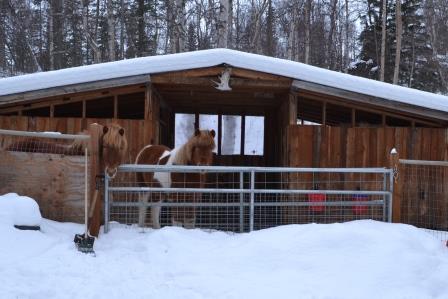
Home > Dispatches > Daily Dispatches 2014 > Daily Dispatch #5
January 5, 2014: The Year of the Horse, Part II
Two days ago, Alice Ciostek sent me an email with a photo and a caption indicating that this is the year of the horse. And I ended up writing a dispatch about this very subject. Coincidently, last night, Andre, Alice’s husband, called and talked for a while with Pete. Pete later mentioned that Andre was mulling over the idea of getting a horse. I think, although I can’t be sure, that the pair went to Craig’s List ad saw the December foal. Undoubtedly, their hearts went out to the little pinto filly, who in the posting is wearing a dog blanket. What immediately came to mind was Delamore Schwartz’s short story, “In Dreams Begin Responsibilities.” He wrote |
|
| this story in his early 20s, and it was said to be the best thing he ever wrote. The central character is in a movie theatre, watching a movie. Suddenly, his parents appear on the screen. They’re happily walking hand-in-hand on the beach. The central character, who knows what’s to become of their relationship, then stands up and yells “Don’t do it.” I, as a central character, then made a causal connection. Unlike the Schwartz character, I don’t know what the future holds for Alice and Andre and the December foal, but like this character, I feel like standing up and yelling “Don’t do it!” Also, like Schwartz, I am not singling out two specific individuals, but rather, I’m speaking in rather general terms. Most relationships go bad. And most horses don’t get their just dues. Like many, Alice and Andre are intelligent, well-read individuals who take very good care of their dogs, birds, and cats. And they might do well having horses around. But I am thinking, a forewarning based on my own observations and experiences might serve them in good stead. First of all, horses are herd animals. You can pair them off with goats, chickens, cows, or other four-legged critters. However, most likely the horse will tell you in its own way (say by developing a vice like wind sucking or cribbing or weaving), that a goat friend just won’t cut it. Doing this can be akin to putting a human in solitary confinement with a senile chicken. Horses. They require that you sink immeasurable amounts of time, money, and space into them. And then some. . . . Time—when I was in horse school, I was told that tending to four horses is a full time job for one person. I then scoffed at this, because I then scoffed at a lot of what my teachers then told me. But gosh, they were right. Today – I have already watered, fed, and cleaned up after my four, taking the time to haul the manure up behind the garden shed. As soon as I finish this dispatch, I will take Tinni and the dogs out for a ride on the trails. Then I’ll ride Raudi. Pete will ride Signy and we’ll pony Hrimmi. Upon my return I’ll put the tack away, feed again, clean up again, and if need be, provide additional water. Then later tonight I will repeat the above, sans riding. Add to this, winter cold, snow, and wind slow one down a bit. Money—I presumed when I purchased Raudi (with pen saving earnings) that I’d be the exception to the rule that horses are like boats, something you sink money into. I presumed wrong. There are feed expenses—forage and supplements. There are tack expenses—saddles, bridles, and grooming gear. There are property maintenance expenses—gravel, fence posts, and wire mesh immediately come to mind. There are vehicle expenses—trucks and trailers. There are manure management expenses—tractors and compost facilities. There are research expenses—books, magazines. There are riding-related expenses—clinics and lessons. There are . . . the list goes on. And keep this in mind, if you have a full time job, you will have more cash on hand, but less time to spend with your equines. Space—Right when we got Raudi, a horse owner noted “Alaska is a hellhole for horses.” This is a statement that Pete and I often repeat, particularly when we see horses standing in small spaces, up to their knees in mud and manure. This is in part because here, vast pastures are a rarity. We have what’s called a dry lot—the horses are together rather than separated. Prior to getting a horse or horses in this state, one should have the land excavated, and put in a gravel base. Mud is bad, really bad for horses. Parasites, bacteria, fungi, and flies all thrive in mud. Furthermore, prolonged mud exposure can lead to bacterial and fungal infections of the skin—like rain scald and scratches. Moreover, horses that forage in mud are predisposed to developing sand or dirt colic. The above considerations (that is time, money, and space) tend to become blurred after a bit. For instance, horses that live in dry lots need to be exercised. This is then a time, space, money consideration. So, some like my good friends Alice and Andre (after reading this) may ask – why, if so much is involved in taking horses on, are YOU doing this? Pete would say that I have the gene. This is true. I do have it. I was born with it. I have not been able to get around it. So I’ve given in to it. And, maybe it’s for this reason that I don’t feel at all inconvenienced or resentful about having to deal with the above. Bottom line, I feel fortunate to be in my horses’ company, and for this reason I feel compelled to provide them with good care. Next: 6. 1/6/14: The Year of the Horse – ta pocketa, ta pocketa |
|
